
Interview with Karl-Heinz [last name deleted to protect identity], Dirlewanger Brigade veteran. Halle, Germany, 1989.
[Above: Professional shot of the men of the Dirlewanger Brigade. Click to enlarge.]
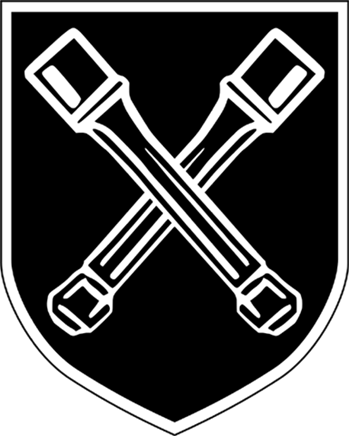

Interview with Karl-Heinz [last name deleted to protect identity], Dirlewanger Brigade veteran. Halle, Germany, 1989.
[Above: Professional shot of the men of the Dirlewanger Brigade. Click to enlarge.]

Thanks for meeting with me, can I ask you what brought you to the Waffen-SS and ask you about your early life?
Karl: I am not going to answer many questions because there are many things I cannot talk of. My father was a Red Front member and when the Nazis came to power he was sent to a camp since he refused to work with them. My mother had to support the family with a small job and state help. I was put to work in Leipzig working on a chicken farm at a young age.
In 1941, I ran into some problems with my boss regarding some missing chickens, so I had to go to court and the judge ordered me to enlist. A recruiter pushed me into an independent unit which had former criminals in it and was ran by the SS. I was accepted and sent to training. This life was okay for me, it was not like what I thought tough military training would be. They treated me fairly well and the food was good.
I knew my time was coming as many were being drafted out of my class. I want to say that the men in this unit were all good men and had been charged with small crimes that the Nazis nonetheless punished. Some were there for poaching, some stole items, were drunk in public, for fighting and desertion. Later we even had concentration camp inmates join us, the army made fun of this and I bring this up as it shows the camps were not what they claimed, a couple men even claimed to be Jews.
Our training was much like the regular army, we were up early, exercised, marched and instruction. They did try to hold political discussions, but this was not often, as we were gearing up for war, not an election.
By 1942 the bandits in the east had started to infiltrate some areas and hold them, so our training focused on fighting them. We did many drills in the woods for tracking, surrounding, and capturing them. We learned explosives, and even entering buildings for close quarter fighting.
Sadly, this training did not prepare me for what I was to witness. However, in 1942 the war was going well and it appeared Germany would win. It was a good time for us, and we were optimistic that serving our nation would help us gain a new identity. That is what brought me to the brigade.
Did you meet Oskar Dirlewanger?
Karl: Yes, he was our commander and every new class that came out of training he would greet and watch us take the oath, which bonded us on penalty of death to him. I remember he was a small man, but a combat veteran, with a hard look. He was fair and always wanted us treated well. He told us he would always look out for us, even though we did not have the best reputations in the Reich, he would help us regain what foolishness had lost. I remember a recruit went AWOL, and he could have had him shot, but instead he only ordered extra watch duty. He was very humane and kind to us.
He told us we had to be prepared for a hard fight, as our enemies were cruel and evil, killing anyone who got in their way. He spoke about seeing innocent children killed because the parents helped Germans, we would see pretty women who could kill us as easy as a hardened soldier. He taught us that we had to be hard if we expected to stay alive as our enemy was only interested in killing us, and our rules made it hard to properly fight back sometimes, but he did stress we must follow the rules of war, and our nation. I stress that. To me he was an unconventional soldier, but he was a good leader of men.
Can I ask you what your first action was?
Karl: I was sent to the first battalion, which was transferred to Russia from Poland. My unit was assigned to work with SS intelligence, which was tracking Jewish insurgents who were working out of ghettos that were set up in 1940. The Allies helped them organize very clever ways of getting them information regarding troop movements and other secrets. Flyers were made that any act of aiding the enemy could be punished by death. This was something that rarely was carried out.
We were allowed by court order to enter and search the ghettos anytime we suspected espionage. A signals truck picked up a radio signal coming from a nearby ghetto and my unit was assigned to go in to search. My comrades did find a Russian field radio, which we learned was transmitting to bandits nearby about our presence. The field police were called and the family taken away to a camp. That was my first action.
My first combat action came a little later. We had to guard over the many Jewish areas, which was boring. We even had time to play with the kids, and meet the girls, even though we had orders not to make friends, as we could give away vital information. I met a Jewish girl my age, who worked making cheese, she would share with me, and I would give her chocolate and cigarettes.
One night a sniper, we believed, had shot a comrade. After much to do and running around like crazy, we found out he accidentally shot himself, while trying to impress a girl with how he could handle his rifle. However the next night, another soldier went missing, a few nights later another was attacked and killed by bandits. Therefore, we knew something was going on. A comrade said he could see campfires far away, so we were ordered to go check them out.
We set off on foot and total quiet was the watchword. It took a few hours to get to where the glow was. Our officer went forward to scout, when all of a sudden he tripped a flare and we could make out a small campsite. The veterans among us opened fire at once, and within seconds, return fire hit us. We fell to the ground and fired wildly. We could not see well, and it was hard to tell if there was a target. My Scharführer ordered a few of us to follow him so we could move around the camp.
I could hear Russian, and fired in the direction of the voice, and then we took fire. My NCO had an MP40 and fired wildly. He threw two grenades in their direction.
After what seemed to be a couple of hours, it was finally quiet. As dawn came we saw the extent of our action. This was a small camp of, I believe, eight bandits, including a woman. One was badly wounded, and was shot to end his suffering, as we had no way to keep him alive. We found two Soldbücher [identification books] for the missing and killed soldier in the possession of one, plus drawings showing our positions. This was a scouting team working for a bigger force.
Did you work with other units, like the Russians, to combat the partisans?
Karl: Yes, the eastern territories we were in were vast. Great hiding places for those who wanted to blow bridges or wreck trains. The Soviets tried to make all civilians retreat with them but the majority did not. Hundreds of thousands volunteered to either work in the Reich or serve with us. Others fought their own ethnic wars alongside us. Many Russians renewed old wars, which we could not stop.
I will say some of these ethnic wars were very cruel. They had old scores to settle with other groups within Russia, and these small wars were deadly. We once came upon a village in Belarus that was burned down, everyone dead. We thought it was the work of bandits, but later learned it was liberation army units [Russian volunteers on the German side]. Bandits had taken over the village, and launched attacks on the families of soldiers in the ROA [Russian Liberation Army, better known in English abbreviated POA.] so they wiped them out to make sure they got them all.
We had in our brigade ex-Soviet soldiers, concentration camp inmates, Russian civilians who helped cook and mend our uniforms, and men released from German prisons. We made quite a motley crew, and the army did not like us, as we were a mixture of everything. With such a wide array of personalities there were bound to be problems. We had fights occasionally, which our leaders stepped in to settle, some men took things from the civilians like food or tools, and other minor issues. These were harshly punished if the guilty were found out.
In addition, I will tell you one secret I know, two new recruits were housed with a Russian couple in their 40s, the wife being very pretty. They got the husband drunk and tried to take advantage of the wife while the husband was passed out. The wife ran out and told a sentry, who got our leader. The men, who were drunk also, admitted to her claim, and since they had been in trouble before they were sent before a summary court-martial for attempted rape and shot the next day. I was in that firing detail.
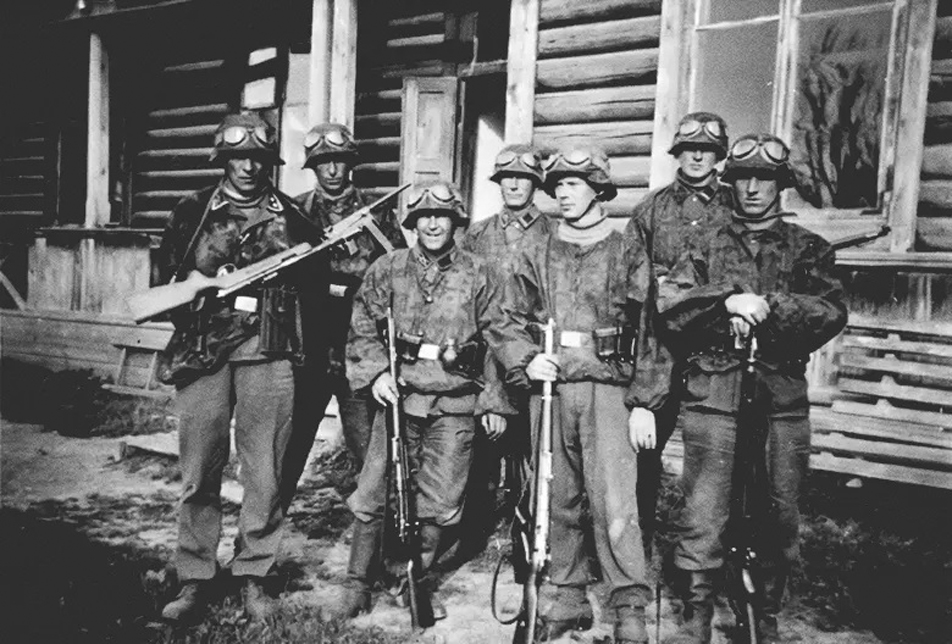
[Above: Motorcyclists of the Dirlewanger Brigade, Belarus, 1943. Note their assortment of weapons.]
That makes me want to ask you about the claims that this unit went all over the eastern front and killed, raped, and tortured anyone you came across. Would you care to address any of these claims?
Karl: Well boy, I just gave you an example as to why the stories about us are a bunch of shit. No military unit is perfect, there will always be men who break down and do things they should not do. The Allies were worse than we were. I asked you not to push me on this issue as in my own country I can go to jail for telling a different story than what my government said happened. I will tell you that the truth is not told about us.
A comrade was just discovered not too long ago and Poland wants him tried, another gave an interview in the 60s saying the claims made against us were false and was arrested and thrown in jail. Another member was an elected official and was removed from office and sued when he said we followed the rules of war. Therefore, we cannot speak the truth for fear about our future.
Okay, fair enough, can I ask you what happened in Warsaw during the uprising at least?
Karl: I will talk about Warsaw, I was there, and then I will never speak of it again. In 1944, when the Allies invaded France, the Soviets launched massive attacks against the thin German front. We were now used as front line combat troops, but we were vastly outnumbered and took heavy losses. The Soviets used massive artillery attacks to break our lines. We steadily retreated back to the outskirts of Warsaw. Reports were coming that Soviet agents had been active in organizing the civilians to rise up and fight, telling them liberation was at hand. Several of our patrols had been ambushed and killed by them.
We started seeing this during the retreat, they knew we were losing, so many civilians, not wanting to be seen as collaborators, started fighting against us in hopes of being forgiven. They would ambush ambulances, trains, and buses. A bus full of retreating Helferinnen [female auxiliaries] was attacked and the girls were raped and shot. I saw this personally outside Warsaw in Zakret, 10 young women and their two soldier escorts. All shot in the head and many of the girls had their pants down and some were bloody in their vaginas. Our leader took pictures to document this cruel act. Jewish bandits were known to be active in the area.
The ROA [Russian volunteers on the German side] units, who were on our flank, captured some fighters and our officers asked they be brought to us. When they arrived we could tell many looked Jewish. Our leaders asked them if they did this, and upon using slight force like bending arms and fingers, they admitted they were part of a large civilian army, put together with help from the Soviets to fight us. 'Yes, they attacked the bus' our interpreter called out. There were fifty or so of them, the leader of the ROA and our leaders conferred, then it was announced that according to military law in the region, they were sentenced to death, and our units and the ROA shot them after tying them up. A few tried to run before justice was served, but they failed.
We noticed battle sounds inside Warsaw, and we were ordered to gather around, von dem Bach [Erich Julius Eberhard von dem Bach-Zelewski (March 1, 1899 – March 8, 1972). von dem Bach was an influential and high ranking SS figure.], Dirlewanger, and other high officers met. They then addressed us all. They said the Allies had raised and armed some civilians in the city who were now fighting us and have committed acts of terror. They were to be treated as bandits, but I want to stress that they told everyone we need to show mercy when it was asked for.
We learned that a year earlier, while removing Jews from the ghetto, due to the crime and active spying they engaged in, they put up a hell of a fight. They murdered several soldiers and civilians and had been given weapons by the Soviets. The SS had to bring in many combat units to quell them, finally breaking them and sending them to camps to be watched. The Soviets even bombed the ghetto, killing hundreds, for no known reason. They did the SS units a favor as they broke their will to fight after this.
Now the Polish civilians were the next target of the Allies, they told them if they helped fight us, they would gain freedom, and we were on the verge of defeat. So they rose up, attacking civilians working for us, and single soldiers. They built vast networks of bunkers and tunnels to conduct hit and run raids. They took over the Jewish ghetto and the western part of the city. This is what we came into.
The army had managed to bring in units to contain the fighters, but any attacks had been repulsed with heavy losses. Luckily we were experienced in this type of fighting. As soon as our trucks dropped us off we came under sniper fire and we had our first dead. Dirlewanger was so angry he phoned demanding tank and air support. A flak truck came up and tore into the area we thought the shots came from. It was ordered the whole building be leveled, and artillery did its job.
They scrambled out like crazy people, firing at us, and we cut them all down. The artillery wreaked havoc on their hideouts. This went on for hours; some stumbled out of nowhere to surrender and were interrogated for information then sent to the rear. There had to be hundreds dead, men, women and children. We were furious these people were that stupid to think they could stand against us, and with their children in tow. How cruel could a parent be to put their children in harm's way? Knowing we would shoot back.
Friendly Poles came to help us and pinpoint the areas of resistance. In one area, we came upon a cellar where German soldiers had been tortured, there was blood everywhere, their teeth were knocked out and fingers cut off. After seeing this, it was announced no more prisoners would be taken, but von dem Bach countermanded this order. Some men, especially the foreign volunteers, ignored it, and shot anyone they caught, due to the level of cruelty these civilians displayed.
We were several days in and the western city was ablaze. Stukas attacked, heavy artillery was used, and we now had flamethrowers to hit these devils where bullets could not touch them. We even had loud speakers going around, asking that they at least let their children go, so they would not be hurt. Some complied, and more surrendered. First aid was set up to deal with their wounded. One fighter surrendered and then threw a grenade at a resting platoon; his whole group was accidentally raked by fire killing four. This was a sad mistake, but our nerves were shot by the level of barbarity these civilians were capable of. That is the power of propaganda.
I remember an army general came to tour the damage and upon seeing the dead that still had not been buried asked if all this destruction was necessary. Dirlewanger and others took him on a tour showing how they would fight to the end, so it was hard taking them prisoner. They held onto the faith that we were done for, and any moment the victorious Allies would roll in to save them. The Soviets even hampered them by shelling the city, but hit areas where they were defending. Doing us a favor yet again and destroying large areas of hideouts.
I was in Warsaw for 2 months, and can say we fought hard and well, but with honor. When the Poles did surrender we took them prisoner, we even took a few British and Soviet soldiers with them. They had been sent in by the Allies to help train and organize.
By October they were finished. They asked for terms and our leaders gave them very generous ones. Everyone would surrender their arms, any criminals would be turned over and the rest can go back home. It was insane, but we had no capacity to handle them. Our food was short so it just made sense to let them go on their own. I could tell they were surprised, many thought we would shoot them all. Many of them lined up to say they were sorry to us, but the tens of thousands who died needlessly were manifested in our faces.
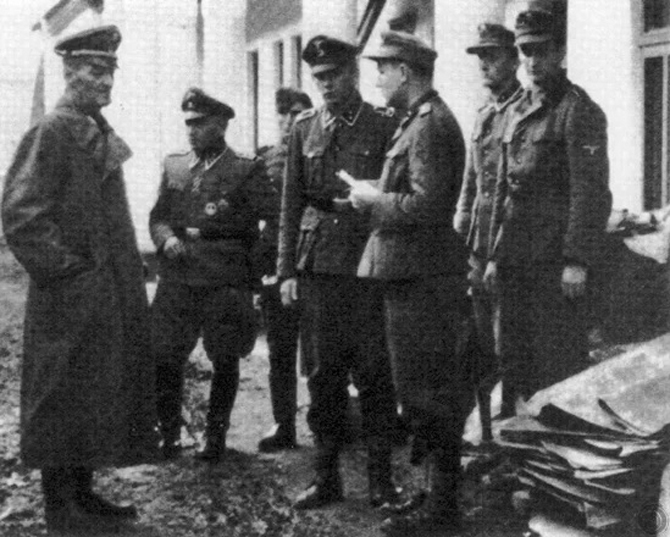
[Above: Men of the Dirlewanger Brigade. Note the man himself, on the far left. Oskar Dirlewanger was a man of deep talents in uniting very diverse men.]
What happened to you at war's end and after?
Karl: After Warsaw we were allowed leave and to recuperate. We were granted a title of a special brigade, and talk of making us a full combat division was heard. We received new volunteers who had special combat training, but were sometimes very young. We received many interpreters as we still had many foreigners with us.
The rest of '44 was quiet; we rebuilt but also had to be moved to Hungary to fight against communists there, who then decided to join us, which we reluctantly accepted. We always had to keep an eye on them. We were part of the units facing the huge Soviet attacks in '45, and put up a hell of a fight. I personally knocked out two T34 tanks with our anti-tank unit. We held them up, but they brought in fresh units and we were out of rounds so were forced to retreat.
We were in Germany now and our division was only a few hundred men, loosely scattered about. The Soviets had bandits actively working with them in front line units, and searching for any stragglers. We were hearing SS men were being killed outright as we had a price on our heads, due to Soviet propaganda telling the masses we were killers of babies and old alike. The Jew Ehrenberg [Ilya Grigoryevich Ehrenburg] was a master of this type of hate, like his Allied counterparts.
By April of '45 we knew it was all over. The civilians who were helping to feed us and take care of us were running out of food, and we knew we had nowhere to go. Our Sturmführer met with us and told us we should remove any SS insignia as the Allies had been convinced we were evil. We then can work our way to their lines and surrender. Many men had already been allowed to go it on their own, but I believed in strength through numbers so I stayed.
I removed my insignia and burned them, as many did. As we retreated, I came across a cart that had an army tunic in it and I took it, leaving my old one behind. We made our way over the Elbe and surrendered to an American patrol. I said I was in the army as an anti-tank gunner, and feigned battle shock. I was sent to a hospital and spent all of May and June resting. I was discharged in August due to battle fatigue and made my way home.
When I started to hear about my unit, and the atrocities we were accused of, I was angered and terrified at the same time. The Soviets were very vengeful and I learned to keep my mouth shut. I went back to work as a farmhand and only rarely connected with survivors for fear of being persecuted. I will tell you we had to fight as we really had no choice, it was bloody, vile, and dirty, but we were not the bad people the papers say that we are. We fought fair and acted with mercy, especially considering whom we fought against.
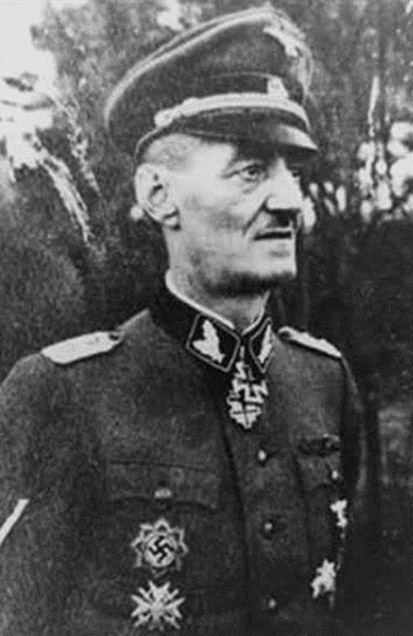
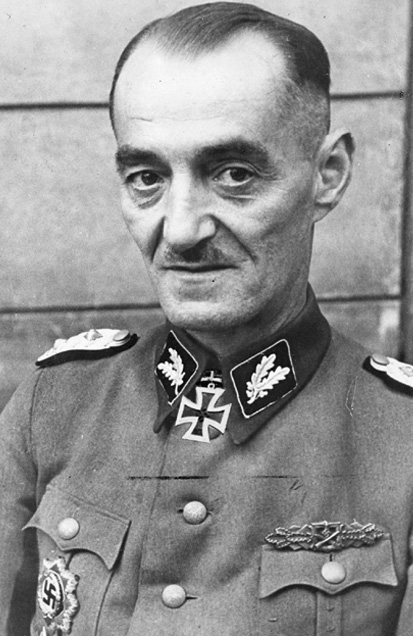
[Above: Oskar Dirlewanger, maligned, hated and lied about more than 99.9% of all National Socialists. This tells the truth seeker to look deeper, beyond the hate and propaganda. The truth is, Dirlewanger was a hero of both world wars. A man who selflessly gave himself to his country, disregarding any risk. He and his brave men operated in the most dangerous and deadly regions of the war. They spit in the enemy's face and smiled in the face of death. Their success rate shows in how much the enemy still hates and fears the name 'Dirlewanger', even 75 years later. This forlorn and gaunt man, the stuff of legend, who disappeared after the war, never to be seen or heard from again.]